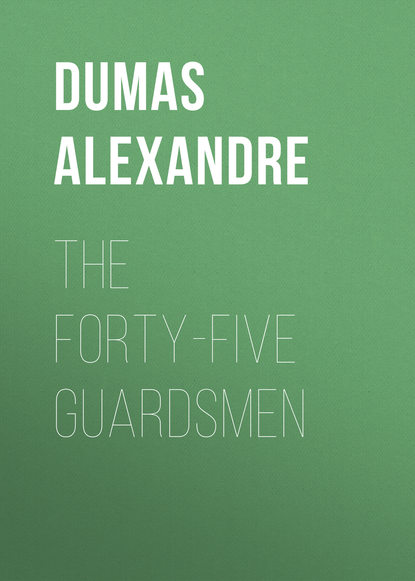По всем вопросам обращайтесь на: info@litportal.ru
(©) 2003-2024.
✖
The Forty-Five Guardsmen
Настройки чтения
Размер шрифта
Высота строк
Поля
"Good," said the king, after reading the duke's letter with evident satisfaction. "Go, captain, and tell M. de Guise that I am grateful for his offer."
"Your majesty will not honor me with a written answer?"
"No, I shall see the duke in a month or six weeks, and can thank him myself."
The captain bowed and went out.
"You see, Chicot," then said the king, "that M. de Guise is free from all machinations. This brave duke has learned the Navarre business, and he fears that the Huguenots will raise up their heads, for he has also ascertained that the Germans are about to send re-enforcements to Henri. Now, guess what he is about to do."
As Chicot did not reply, Henri went on.
"Well! he offers me the army that he has just raised in Lorraine to watch Flanders, and says that in six weeks it will be at my command, with its general. What do you say to that, Chicot?"
No answer.
"Really, my dear Chicot," continued the king, "you are as absurdly obstinate as a Spanish mule; and if I happen to convince you of some error, you sulk; yes, sulk."
Not a sound came to contradict Henri in this frank opinion of his friend. Now silence displeased Henri more than contradiction.
"I believe," said he, "that the fellow has had the impertinence to go to sleep. Chicot!" continued he, advancing to the armchair; "reply when your king speaks."
But Chicot did not reply, for he was not there; and Henri found the armchair empty.
He looked all round the room, but Chicot was not to be seen. The king gave a superstitious shudder; it sometimes came into his mind that Chicot was a supernatural being – a diabolic incarnation, of a good kind, it was true, but still diabolical.
He called Nambu the usher, and questioned him, and he assured his majesty that he had seen Chicot go out five minutes before the duke's messenger left.
"Decidedly," thought Henri, "Chicot was vexed at being in the wrong. How ill-natured men are, even the best of them."
Nambu was right; Chicot had traversed the antechambers silently, but still he was not able to keep his spurs from sounding, which made several people turn, and bow when they saw who it was.
The captain came out five minutes after Chicot, went down the steps across the court proudly and with a satisfied air; proud of his person, and pleased that the king had received him so well, and without any suspicions of M. de Guise. As he crossed the drawbridge, he heard behind him steps which seemed to be the echo of his own. He turned, thinking that the king had sent some message to him, and great was his stupefaction to see behind him the demure face of Robert Briquet. It may be remembered that the first feeling of these two men about one another had not been exactly sympathetical.
Borromée opened his mouth, and paused; and in an instant was joined by Chicot.
"Corboeuf!" said Borromée.
"Ventre de biche!" cried Chicot.
"The bourgeois!"
"The reverend father!"
"With that helmet!"
"With that buff coat!"
"I am surprised to see you."
"I am delighted to meet you again."
And they looked fiercely at each other, but Borromée, quickly assuming an air of amiable urbanity, said, "Vive Dieu, you are cunning, M. Robert Briquet."
"I, reverend father; and why do you say so?"
"When you were at the convent of the Jacobins, you made me believe you were only a simple bourgeois."
"Ah!" replied Chicot, "and what must we say of you, M. Borromée?"
"Of me?"
"Yes, of you."
"And why?"
"For making me believe you were only a monk. You must be more cunning than the pope himself; but you took me in the snare."
"The snare?"
"Yes, doubtless; a brave captain like you does not change his cuirass for a frock without grave reasons."
"With a soldier like you, I will have no secrets. It is true that I have certain personal interests in the convent of the Jacobins; but you?"
"And I, also."
"Let us chat about it."
"I am quite ready."
"Do you like wine?"
"Yes, when it is good."
"Well! I know a little inn, which I think has no rival in Paris."
"And I know one also; what is yours called?"
"The 'Corne d'Abondance.'"
"Ah!"
"Well, what is it?"
"Nothing."
"Do you know anything against this house?"
"Not at all."

















